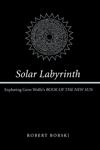I sometimes say that I don't like puzzles. This isn't entirely true. What I don't like much is solving puzzles, but I quite enjoy a good explanation of a puzzle, showing how the puzzle was set up and how one would go about solving it. It's a bit similar to not enjoying writing proofs, but enjoying reading a good explanation of an elegant one.
Gene Wolfe's Book of the New Sun (starting with The Shadow of the Torturer and concluding with The Urth of the New Sun) is a puzzle, one that I enjoyed in parts regardless, but a puzzle that clearly had more depth than I was willing to plumb. Solar Labyrinth is an explanation of the puzzle, or at least large parts of it, and as such I enjoyed it quite a bit, perhaps more than the series itself.
This is a very rare sort of book, a full-length non-fiction analysis of a science fiction series. Usually this sort of book is reserved for works of classical literature, and it's a sign of the degree of literary complexity of the Book of the New Sun that it can support an entire book (albeit slim) of analysis. Solar Labyrinth is not padded, either; each basic theory is set forward in a brief essay, some only a few pages. Borski is clear enough for someone with only a casual understanding of literary analysis (like myself) and only rarely retreats into jargon, although it does help to have a large vocabulary. He also does a fair job of pointing out where interpretations are disputed and where his theories are controversial or a bit of a stretch.
The layers that Wolfe put into the Book of the New Sun are impressive. In a few places, I felt a bit stupid to have missed obvious clues, but for the most part I was just shaking my head, appreciating the artistry, and thinking that I never would have taken the time to put the pieces together myself. I highly recommend this book to anyone who's read the whole series, and it may even be worth finishing the series if you'd given up partway through, just so that you can fully appreciate this analysis. Borski confines his analysis almost entirely to the New Sun, so don't worry about spoilers if you've not yet read the Books of the Long Sun or Short Sun (in fact, the most extensive references to Wolfe's work outside of the New Sun were to The Fifth Head of Cerberus).
There were two things that bothered me, however. One is that, as he warns in the foreword, Borski assumes that you are very familiar with the Book of the New Sun and doesn't waste any time providing background. I think his warning that Solar Labyrinth is only for serious readers of Wolfe is a bit overstated, as I'm certainly not a serious reader and I managed well enough, but I had just read the series and it was fresh in my mind. I would like to recommend this book to friends who had read New Sun some time back, but without a basic plot synopsis or timeline as a memory refresher, the reading may be hard going. I particularly missed a dramatis personae and think it's a shame Borski didn't include one, as he mentions characters (including minor ones) constantly in passing and just expects the reader to remember who he's talking about. A list of characters, their obvious roles in the book, and summary information about who or what Borski thinks they are would have been very welcome.
The second problem with this book is that Borski uses endnotes extensively. I truly hate endnotes. I can tolerate them when the only thing in the endnotes is purely references (although even there, I'd rather see MLA-style citations), but when they're used for interesting asides and additional information, as they are here, I find them infuriating. It's just obnoxious to have to read the book with an extra bookmark at the endnotes and constantly skip back and forth to follow Borski's complete train of thought.
I know footnotes have become passé. I don't care. People read linearly, and all of the information related to a page of text needs to be put on that page. I don't care if they're hard to typeset or if you think they look ugly; people have been using them for years, for very good reasons.
Layout concerns aside, this book was a lot of fun. If you've read the Book of the New Sun, had that feeling that lots of things were going on that you weren't quite getting, and still remember it well enough to be able to follow an analysis without much introduction, I think you'll enjoy this book. And if you are interested, I recommend picking up a copy soon; the market for books like this tends to be highly limited, and they therefore tend to go out of print quickly and then become quite rare. After reading Solar Labyrinth, I'm somewhat interested in reading Michael Andre-Driussi's Lexicon Urthus, and it looks like finding a copy of that is going to be quite a search.
Reviewed: 2004-09-12
